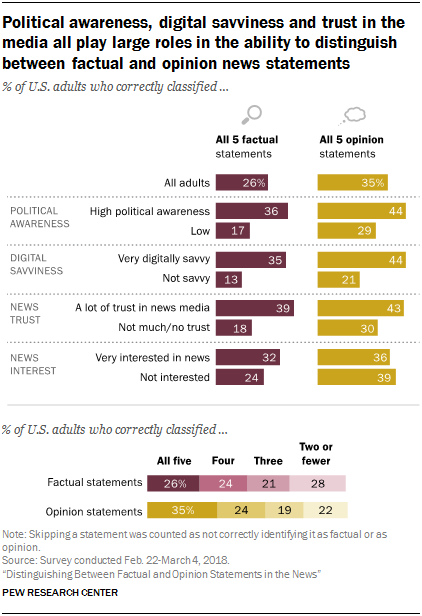Few Americans are good at distinguishing between factual news and opinion — and it may have something to do with their trust in media and political awareness.
According to a Pew Research Center study published today, a majority of Americans were able to identify three of five news-related factual and opinion statements shown in a survey — but only 26 percent correctly identified all five factual statements, and 35 percent correctly identified all five opinions. Pew differentiated the two with the definition “the capacity to be proved or disproved by objective evidence.”
“The findings reveal that even this basic task presents a challenge,” reads a press release sent to Poynter. “Certain Americans do far better at parsing through this content than others, specifically those with high political awareness, those who are very digitally savvy and those who place high levels of trust in the news media.”
The study surveyed 5,035 U.S. adults between Feb. 22 and March 4, who were shown five factual statements, five opinions and two “borderline” statements.
The results parse through which types of people were best and worst at telling objective news from opinions. Politically aware respondents were more likely to correctly label factual statements, as were those who were digitally savvy and trusted information in national news outlets.
Those differences extended beyond skills and awareness, too; Democrats and Republicans were more likely to say statements were factual if they confirmed their ideological beliefs. Survey respondents also tended to disagree with factual statements that they incorrectly said were opinions.
“When Americans labeled a news statement as factual – even if it was an opinion – they overwhelmingly also believed it to be accurate,” the release reads.
And even when they’re exposed to different media brands, Americans are still only slightly more likely to successfully tell fact from opinion.
In a separate part of the study, participants were shown eight different statements attributed to one of three national news outlets: The New York Times, Fox News and USA Today. That labeling had little impact on how participants labeled statements, but Republicans were slightly more likely to successfully identify the three factual statements than Democrats where they were attributed to Fox.
Editor's note: An earlier version of this story included a tweet from a government professor that questioned some of the report's wording. After an explanation from Pew, that tweet was deleted, so we've removed it from the story. You can see the back and forth here.









